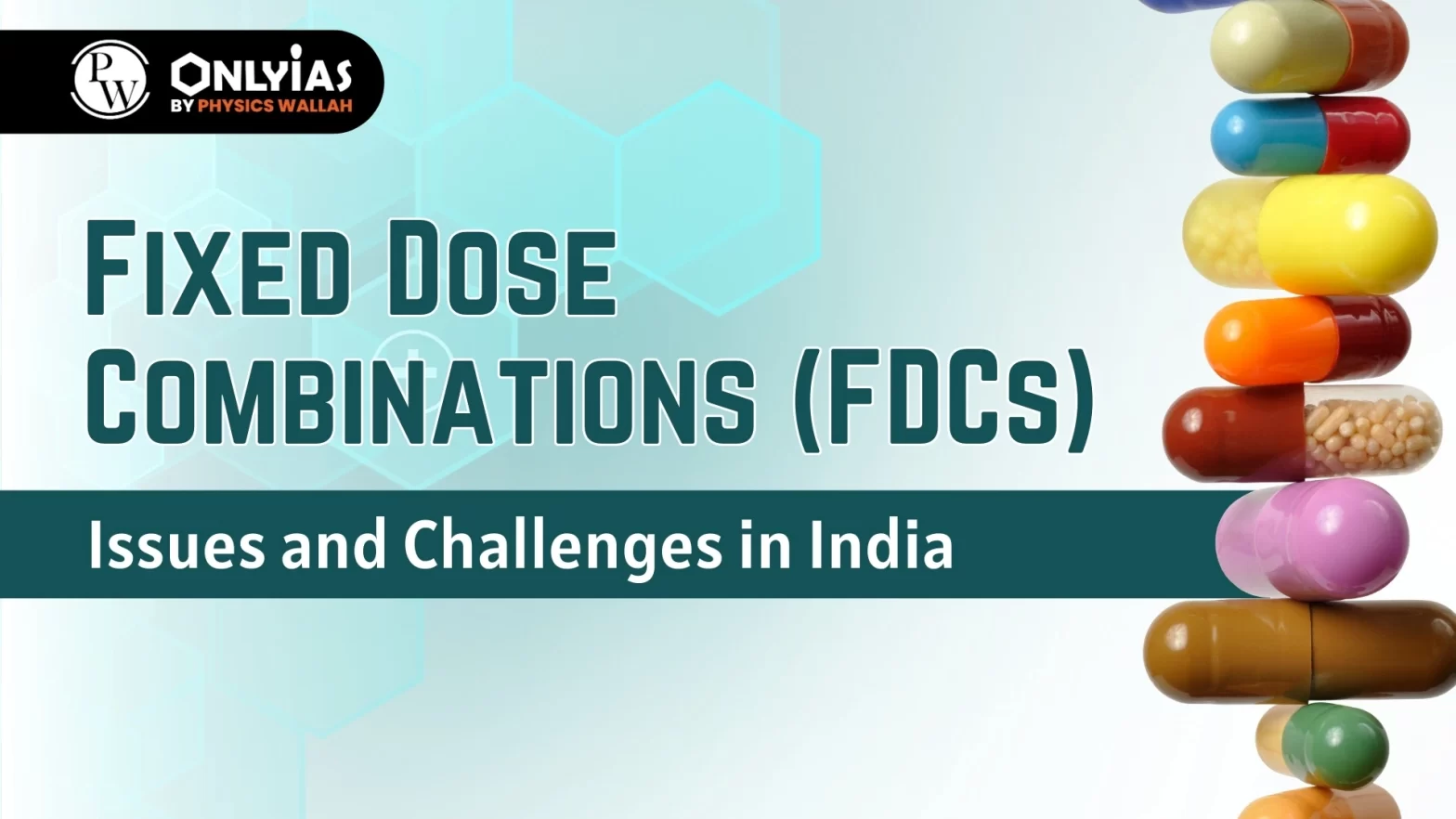Context: This article is based on an Editorial “India’s alarming ‘fixed dose combination’ problem” Which was published in the Hindu. Recently, a group of academics from India, Qatar, and the UK published a new study in the Journal of Pharmaceutical Policy and Practice on unapproved and even banned fixed dose combinations (FDCs) of antibiotics that are being sold in India.
| Relevancy for Prelims: Antibacterial Microbial Resistance (AMR), Drugs and Cosmetics Act, 1940, Drugs Controller General of India, and Central Drugs Standard Control Organization.
Relevancy for Mains: Fixed Dose Combinations (FDCs)- Challenges for India and the Way Forward. |
Why India Cracks Down on Antibiotic Fixed Dose Combinations (FDCs)
- A Huge Ban & Unapproved Fixed Dose Combinations (FDCs): In 2020, 60.5% of antibiotic FDCs sold were unapproved, and 9.9% were banned in India.
- Rationale of Ban & Unapproval of FDCs: The reason for the huge number of unapproved or banned FDCs containing antibiotics is alarming because of the increasing prevalence of antibacterial microbial resistance (AMR) in India.
Must Read Drug Price Regulation in India, here.
Fixed Dose Combinations (FDCs): Significance, and Challenges
- Combination of Multiple Drugs: Fixed Dose Combinations combine multiple drugs into a single medication, which improves patient compliance as taking one tablet is easier than multiple pills.
- Significance: For diseases such as AIDS, it is well documented that FDCs have proven to be very useful in improving patient compliance and hence improve treatment outcomes.
- Challenges: FDCs need careful testing as combining drugs can reduce their efficacy or create toxic interactions (often called metabolites). Hence, regulatory approval is critical before marketing FDCs.

Why does the pharmaceutical industry promote the use of Fixed Dose Combinations (FDCs)?
- Escape Price Control: Individual drugs face price caps but not combinations. Under the Drugs (Prices Control) Order, (by which the government fixes the prices of individual drugs), drug combinations were traditionally not covered, hence the pharmaceutical industry uses fixed dose combinations (FDCs) as an easy way to escape the price cap.
- For Profit Making: It gives individual companies a reason to charge higher prices for their drugs. As to create an FDC, companies can claim it as a new unique product catering to a specific need, thereby allowing them to charge a higher price.
- Avoidance of Quality Testing: As Indian Pharmacopoeia Commission standards don’t exist for most FDCs. Hence, no risk of “not of standard quality” prosecution under the Drugs & Cosmetics Act, 1940.
What rules and laws govern Fixed Dose Combinations (FDCs) in India?
- Drugs and Cosmetics Act, 1940: The fixed dose combinations (FDCs) problem has been on the regulatory radar since 1978 when the first government committee studied the issue and admitted this problem. At the time, there was no system under the colonial-era Drugs and Cosmetics Act, 1940 to stop FDCs sale.
- Provision of Prohibition: In 1982, Parliament changed the law to give the central government the power to “prohibit” the manufacture of specific drugs that lack therapeutic justification.
- Approval by DCGI: In 1988, the central government amended the rules to introduce a new requirement for manufacturers of all “new drugs”, including FDCs, to submit proof of safety and efficacy to the Drugs Controller General of India (DCGI) who heads the Central Drugs Standard Control Organization (CDSCO).
- It made clear that State drug controllers could not grant manufacturing licenses for new drugs that are not approved for safety and efficacy by the DCGI.
What are the concerns associated with the use of Fixed Dose Combinations (FDCs) in India?
- Acceleration of Antimicrobial Resistance Cases: The widespread use of unapproved and irrational antibiotic fixed dose combinations (FDCs) can accelerate antimicrobial resistance in India, severely impacting the ability to treat infections.
- Failure on Regulation: The decades-long failure to curb this practice reveals glaring gaps and incompetence in India’s drug regulatory framework.
- Not Strict on License Approval: State drug controllers openly flout laws and continue giving manufacturing licenses for FDCs not cleared by DCGI.
- Sporadic banning of specific FDCs plays whack-a-mole as manufacturers then promote similar alternate FDCs.
- Judicial Inconsistencies: Inconsistencies in interpreting DCGI’s FDC banning authority under Section 26A also enable manufacturers to sell more FDCs.
The Path Ahead
- Strictness on Licensing Process
- Strict implementation of Laws and Regulations
- Easing out of Complex Litigations
- Sensible prescribing of FDCs by doctors
Conclusion:
Addressing the rampant issues surrounding unapproved and banned Fixed Dose Combinations (FDCs) of antibiotics in India requires a comprehensive and stringent approach, emphasizing strict regulatory enforcement, legal consistency, and promoting responsible prescribing practices to mitigate the alarming challenges posed by antimicrobial resistance.
| Prelims Question (2019)
Which of the following are the reasons for the occurrence of multi-drug resistance in microbial pathogens in India?
1. Genetic predisposition of some people
2. Taking incorrect doses of antibiotics to cure diseases
3. Using antibiotics in livestock farming
4. Multiple chronic diseases in some people
Select the correct answer using the code given below.
(a) 1 and 2
(b) 2 and 3 only
(c) 1, 3 and 4
(d) 2, 3 and 4
Ans: (b) |
![]() 9 Dec 2023
9 Dec 2023


